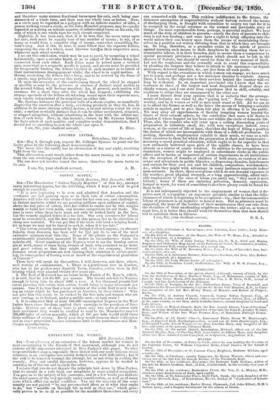North Brixton, 16th December 1859.
Stn—The Manchester " Cotton Supply Reporter" of this day, amongst many interesting papers, has the following, which I hope you will be good enough to republish.
" It is now beginning. to be seen and admitted that America and the continent are fast gaining upon us in their rate of cotton consumption. America will take the cream of her cotton for her own use, and challenge us in distant markets, whilst we are pouring millions upon millions of capital, above the fair price of cotton, into her coffers to enable her by this surplus wealth to build her rival mills, and become competitors for our trade. The time is come when these facts must not only be looked fairly in the face, but the remedy applied before it is too late. Our own resources for labour must be economized, and the first step in this process lies in the direction of cheap raw material. We can get this if the trade will lend a helping hand ; let us hope we may not be forced to seek it, when it is too late."
"The cotton recently received by the British Cotton Company, ex steamer Saladin from Jamaica, has been sold for Md. per lb. to one of the most extensive spinners near this city. Some of the plants on the Company's experimental plantation measured 24 inches in circumference when six months old. Great numbers of the Negroes went to see the Dunlop cotton &at work, many of them being owners of land, who promised to go home and grow cotton, so that they might sell it to the company. Several Jamaica estate proprietors are now turning their attention to cotton-grow- ing, in consequence of having seen or heard of the experimental plantation at Content."
These facts will speak for themselves, I will, however, add three others, well worthy of consideration. 1. There is a gentleman now in London, who has in his garden near Spanish Town, Jamaica, cotton trees in full bearing which were planted twenty-five years ego. 2. The Earl of Harwood has an estate in the Parish of St. Mary's, which, it is said, that he lets for 601. per annum. The tenant sub-lets to Negroes enough to bring him in above 300!. a year. A few thousand pounds laid out in planting this estate with cotton, would bring in many thousands per annum. Can it be true that a near relation of the noble Earl is now work- ing an estate which he has purchased in America, by slave-labour ? Why not give him this estate to be worked by the free men and women who are now renting, as in Ireland, under a middle man—at rack rents ? ' 3. It is computed that at least 100,000 emancipated Negroes in the West Indies have, since freedom, applied their earnings to the purchase of free- holds. If every one of those were to plant only two acres of cotton with their provisions they would be enabled to send to the Manchester market 300,000 bales of cotton annually, which at 10/. per bale would yield them three millions of money. Every year they would increase their cultivation and in exact proportion become customers both to the landowners and Man- chester manufacturers.






























 Previous page
Previous page